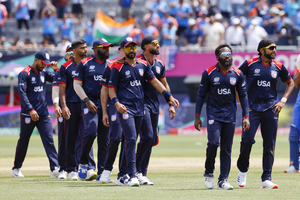Sports
T20 World Cup: Stuart Law admits 'penalty runs didn't affect' USA's defeat to India

New York, June 13
USA head coach Stuart Law said he wouldn’t blame his team's defeat to India in the men’s T20 World Cup Group A match over the five-run penalty they were penalised for not starting their overs in time.
Law also admitted that players should have responded earlier to the previous warnings they got.
After restricting USA to 110/8, a nervy India chased the target in 18.2 overs, thanks to an unbeaten fifty from Suryakumar Yadav. But ahead of the start of the 16th over of their chase, India needed 35 runs to win. With USA being imposed the five-run penalty under the stop-clock rules, the equation was reduced to 30 runs needed off 30 balls.
"Players know the rule, but it's something that if you haven't played with it for a long time, it's very difficult to have it embedded in your brain. So, the information coming from the umpires was, they were given two clear warnings, then it's up to the players to respond. We didn't respond fast enough, we didn't do it well enough, and that's something we can address."
"I don't think it affected the outcome of the game. Five runs wasn't going to affect the outcome of the game so I don't think it rattled (the players). No, I thought we stuck to our guns, we fought hard, we fought to the death. I thought we showed some fantastic character against one of the best teams in the world," said Law in the post-match press conference.
He further said it wasn’t something which took the USA team by surprise. "We had a few warnings in earlier games, and it's something we do talk about to get through faster between the overs. It's just one thing that we can improve on. I think that we're only a fledgling team. There's plenty to learn."
“There's not just the cricket aspect of the game of cricket, but there's also the other intricacies that need to be embedded (among the players). It's a rule that's only just come in. A lot of our players wouldn't have heard about it before we played in the Bangladesh series or the Canada series earlier this year. So, look, it's something that we need to address, we'll sit down and talk about, but we can improve it."
Asked if this was the ideal way to speed up cricket games internationally, Law remarked, "I think there needs to be a pace of play. I think if you're dragging games out that should last three-and-a-half hours, they're going for four-and-a-half hours, that's a bit much. The ICC are there to install rules and regulations. We as coaches and teams are there to follow those rules and regulations."
“If there's enough voices saying that it may be detracting from the game, I'm sure the ICC will act to it. I don't see it as a bad thing, I see it as a good thing. The game continues to move. When momentum is with you, you want to keep that momentum running quicker and put the opposition under pressure that way.”
"So it's neither here nor there. It didn't affect the result of the game as many people will suggest. But to lose five runs was crucial at that time. But, once again, it may have just taken us to the 19th or 20th over, rather than finishing it in the 18th."
USA now need a win or a no-result in their final Group A match against Ireland to qualify for the Super Eight stage. Left-arm fast-bowler Saurabh Netravalkar came under the spotlight again due to taking out Indian openers Rohit Sharma and Virat Kohli in quick succession.
Law signed off by appreciating his bowling prowess in the T20 World Cup so far, though he conceded more power-play scalps would have turned the game’s outcome. "He was running hot. He was full of confidence after the Super over against Pakistan as well. He bowled beautifully in that game also. Look, he got the ball to do a bit.”
“That ball that nearly bowled Rishabh Pant, if that had happened there and then, we know we could have been sitting here telling a different story. But look, he's a class act. Call him the Iceman now after that Super over. Look, when he's running hot like that, one more wicket at that stage could have been the difference. So, we needed to take wickets.”
“We needed to bowl India out basically to win the game. We were never going to contain them with the power hitters they still had in the shed. Hardik Pandya, Axar Patel were still to come. We needed to bowl them out so wickets up front was crucial. We just didn't quite get enough in that power play,” he concluded.

















































